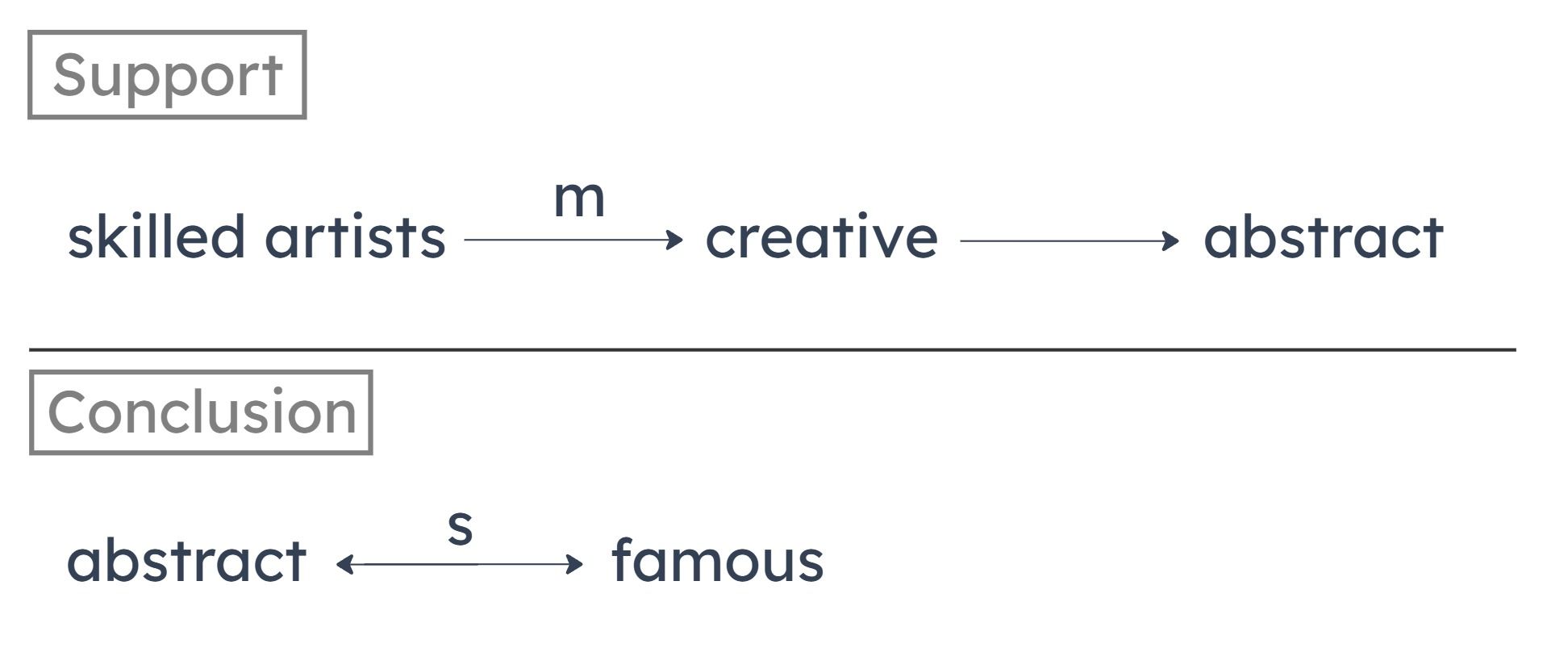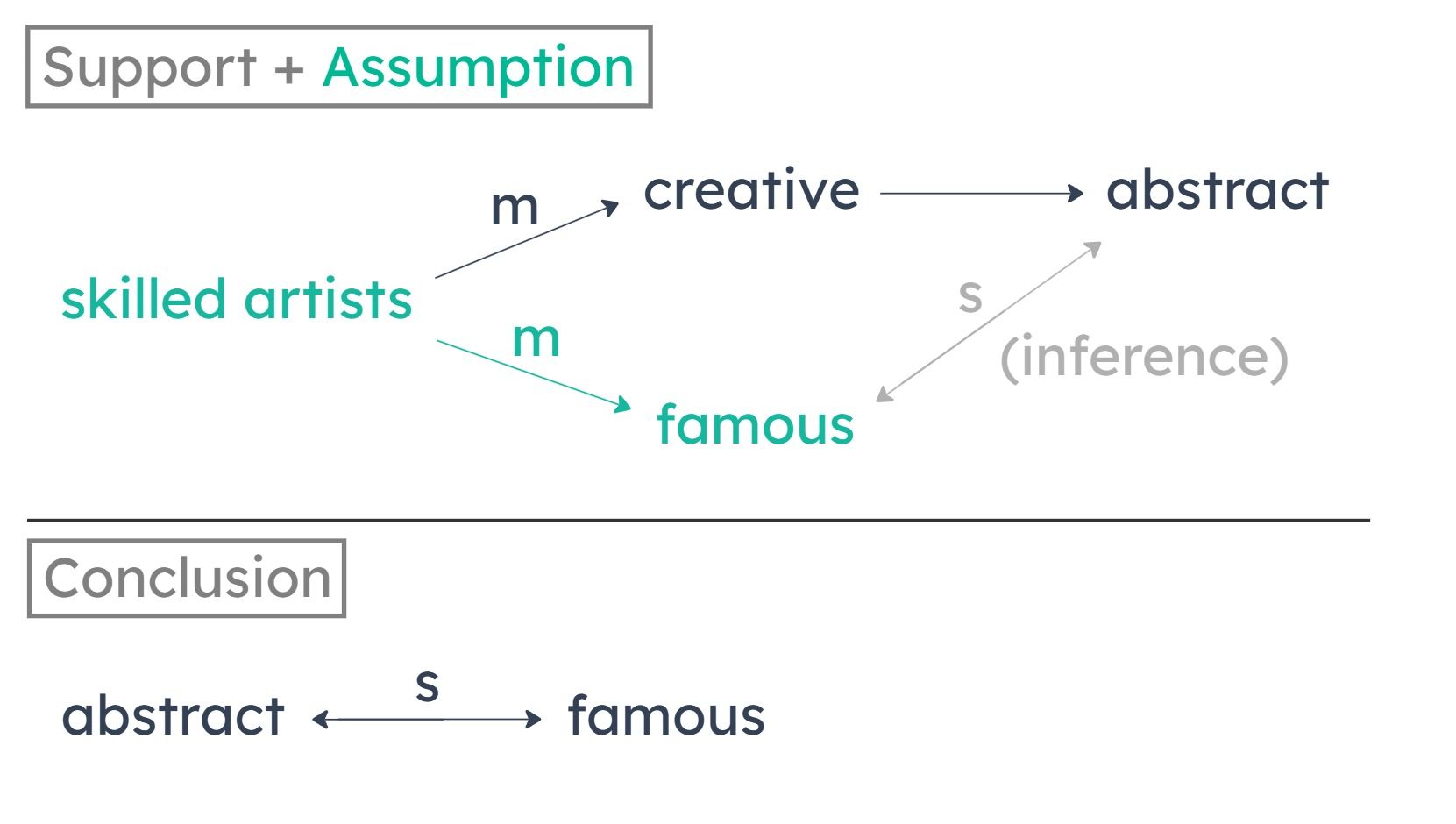Summary
The argument concludes that the economy is doing badly for two reasons: the first because the real estate market is in a slump and the second because car sales are low. If the economy were healthy, at least one of these two phenomena would not occur.
Strongly Supported Conclusions
If the economy were healthy then either car sales are not low, the real estate market is not in a slump, or both.
A
If car sales are at their lowest in years, then it is likely that the economy is doing badly.
We don’t know if low car sales alone is sufficient for a bad economy. Rather, the argument suggests that low car sales combined with a real estate slump lead to a bad economy.
B
If the economy is doing badly, then either the real estate market or the car sales market is not healthy.
We know that low car sales combined with a real estate slump are sufficient for a bad economy, but we do not know if these are the only two factors sufficient for a bad economy. A necessary condition’s occurrence does not imply the sufficient condition’s occurrence.
C
If the real estate market is healthy, then it is likely that the economy as a whole is healthy.
We don’t know what conditions are sufficient for a healthy economy. There could be other factors outside of the real estate market and car sales that lead to a bad economy.
D
If the economy is in a healthy state, then it is unlikely that the real estate and car sales markets are both in a slump.
The argument states that if car sales are not low or the real estate market is not in a slump, the economy is likely to be healthy. Therefore, if the economy were healthy it is likely that at least one of these phenomena occurred.
E
The bad condition of the economy implies that both the real estate and the car sales markets are doing badly.
We know that low car sales combined with a real estate slump are sufficient for a bad economy, but we do not know if these are the only two factors sufficient for a bad economy. A necessary condition’s occurrence does not imply the sufficient condition’s occurrence.
Summary
The author concludes that some people who are good at abstract reasoning are famous.
This is based on the following premises:
Most skilled artists are very creative.
All people who are very creative are also good at abstract reasoning.
(The part about “not all” skilled artists being famous isn’t being used as a premise, because it doesn’t help prove a claim about some people being famous.)
This is based on the following premises:
Most skilled artists are very creative.
All people who are very creative are also good at abstract reasoning.
(The part about “not all” skilled artists being famous isn’t being used as a premise, because it doesn’t help prove a claim about some people being famous.)

Missing Connection
We know from connecting the two premises that most skilled artists are good at abstract reasoning. How can we get from this to the conclusion that some people good at abstract reasoning are famous?
Notice that “famous” is a new concept in the conclusion. We want to add something that will guarantee at least some of the skilled artists who are good at abstract reasoning are famous. For example:
Most skilled artists are famous.
Everyone who is very creative is famous.
Notice that “famous” is a new concept in the conclusion. We want to add something that will guarantee at least some of the skilled artists who are good at abstract reasoning are famous. For example:
Most skilled artists are famous.
Everyone who is very creative is famous.
A
Most skilled artists are good at abstract reasoning.
(A) doesn’t tell us anything about who is famous. Since we don’t have any premise that establishes who is famous, an answer that doesn’t tell us who is famous cannot make the argument valid.
B
Most people who are very creative are skilled artists.
(B) doesn’t tell us anything about who is famous. Since we don’t have any premise that establishes who is famous, an answer that doesn’t tell us who is famous cannot make the argument valid.
C
Some skilled artists are not famous.
Learning that some skilled artists are NOT famous doesn’t help me prove who IS famous.
D
All people who are good at abstract reasoning are very creative.
(D) doesn’t tell us anything about who is famous. Since we don’t have any premise that establishes who is famous, an answer that doesn’t tell us who is famous cannot make the argument valid.
E
Most skilled artists are famous.
If most skilled artists are famous, and we know from the premises that most skilled artists are good at abstract reasoning, that establishes some people who are good at abstract reasoning are famous.
